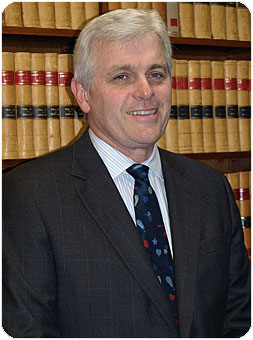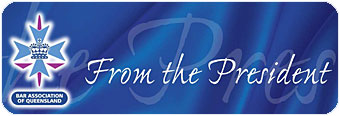FEATURE ARTICLE -
From the President, Issue 39: Dec 2009
The President’s Christmas Greetings Speech – 16 December 2009

THANKS TO THE JUDICIARY, AND TO OTHERS
On behalf of the Queensland Bar, I express gratitude to the judiciary for their industry and application in disposition of litigious business over the past year. We are serviced, in this State, by a judiciary, and tribunal members, state and federal, of enviable quality.
Chief Justice, for the past 11 years, you have ably led the legal profession in this State. You have exposed us, properly and sensibly, to public scrutiny through the print and electronic media.
The media has not always been kind in return but you are well ahead on points. The exposure you have attracted for our profession has greatly diminished the mystique with which it was ordained in bygone years.
Attorney General, your skilful and inclusive stewardship of your office is greatly appreciated. The Bar Association enjoys an even handed and productive relationship with you. During my presidency I hope to take that to an even higher level.
I thank also the Shadow Attorney-General for seeking the Association’s views on current issues and maintaining an open dialogue with us.
Ms Hunter, my predecessors as president speak highly of your skill and judgment. The Association will miss your contribution as Director General. We wish you well in your future endeavours.
My Association also expresses thanks to its immediate past President and Vice President, Mr Michael Stewart SC and Mr Michael Byrne QC, and to the immediate past Honorary Treasurer, Mr Douglas Murphy SC. Their long service on the Bar Council, and leadership, have been invaluable to our members.
Mr Dan O’Connor recently completed 15 years as the Association’s Chief Executive. He is the integral element in our administrative structure. Thank you Dan. Keep tolerating us.
NATIONAL REGULATION
The Bar supports the views expressed by you, Chief Justice, apropos federal proposals for regulatory reform of the legal profession.
The role of an independent legal profession, and its value to the independence of the judiciary, and more generally to the rule of law, cannot be doubted. It is critical to the maintenance of judicial independence that judges be appointed from a strong and independent legal profession. For that reason, local professional bodies representing practitioners, and reflecting local nuances, ought continue to perform a significant role in the organisation and regulation of the profession.
It is anathema to think that the extant smooth working arrangements, in this State, may be usurped by executive government, in a single blow or incrementally, introducing well meant, but ill considered change in professional regulation and standards.
WHAT THE ASSOCIATION DOES
Those existing arrangements entail each of the Bar Association and Law Society performing important statutory roles in the regulation of the profession.
The Association is the sole author of the statutory administrative rules pertaining to the regulation of the profession insofar as concerns matters of bar practising certificate application, pupillage and continuing legal education. The Association advises the Attorney in relation to the content of the statutory professional conduct rules. The Association issues annual practising certificates to those desiring to practice at the Bar. The Association performs, at the behest of the Legal Services Commission, investigation of disciplinary complaints against barristers.
We enjoy a close relationship with the Commission, through its competent and well-respected head, Commissioner John Briton. The Commission monitors our conduct, electronically and by audit. The Association takes its statutory role very seriously.
In the issue of practising certificates, in respect of which there exists a right of appeal or review in the Supreme Court, we have refused practising certificates to applicants who we consider do not satisfy the requisite statutory fit and proper standard. In respect of other applicants harbouring any arguably questionable conduct history, we have imposed strict conditions so as to afford public protection.
If barristers carrying certificates omit to comply with their obligations in relation to taxation, compulsory insurance or continuing legal education, we act without hesitation to require immediate compliance or redress. That occurs whether the person concerned is a senior silk or a fresh junior. We extend no favour.
The Association’s Professional Conduct Committee, chaired by the Vice President, Roger Traves SC, consists of a diligent group of about 12 silks and juniors. On referral by the Legal Services Commission, the Committee undertakes extensive investigative, advisory and complaint drafting work. This wholly unremunerated work assists the Commission in making its prosecutorial decisions.
The Association undertakes all these tasks informed by local knowledge enjoyed by us as local practitioners.
All this, with the paid administrative support staff required, we afford on a modest Government stipend, last financial year about $129,000, and without indemnity from the State for legal costs incurred by us upon any appeal from our decisions. In the last 12 months, most of that stipend was consumed in defending appeals by one unsuccessful applicant for a practising certificate.
We make no complaint about all this. Rather, in addressing these matters, we seek to underscore the pivotal and efficient regulatory role played by a local legal association such as the Bar Association of Queensland, and by parity of reasoning the Queensland Law Society.
That is what falls to be lost or eroded by adoption of an as yet uncosted alternative national regulatory regime.
ASSISTANCE IN LEGISLATIVE DRAFTING
On a different topic, the Bar Association continues to assist the State Government in the drafting of legislation. We do so even in circumstances where we oppose the policy which underlies, or content of the legislation. An example is the recent “Bikie” legislation.
Irrespective of opposition to policy or content, Bar Association members maintain a strong desire, and possess the necessary legal drafting skills to be part of the solution. Proper legislative drafting, particularly of controversial legislation, is critical. Barristers, naturally, on briefs in courts and tribunals, relish the prospect of identifying the lacunae and shortcomings in enactments. That conceded, in the interests of justice and certainty, the Association would prefer the public enjoy the benefit of enactment of clear and well considered legislation in the first instance, all within the overarching policy intent.
I thank the members of my Association who spend what little spare time they have drafting the numerous submissions which the Association remits annually to the State Government concerning matters of proposed legislative policy, and consequential drafting.
DEFENDING THE JUDICIARY
The Bar Association will also continue to perform the role of defending the judiciary against unwarranted or unfair attack. [The President’s letter to the Editor of The Courier-Mail concerning the reports that appeared in that publication regarding the jurisprudential allowance are reproduced at the conclusion of this extract from the President’s address. Ed]
The recent media attack upon the judiciary in respect of utilisation of legislatively imprimatured travel entitlements was an unprincipled and uninformed attempt to diminish the standing of the courts.
The media, and some members of the public, just don’t seem to understand that judges may be remunerated from the public purse, but they are not public servants. I exclude journalist Mr Mark Oberhardt from my criticism.
Last week I met informally with editorial staff from the Courier Mail with a view to my Association, on an arm’s length basis, providing legal input, if not articles for that newspaper. The response was positive.
If this leads to more accurate and better informed, albeit perhaps less sensational media copy, then we will be a step ahead of the present position.
JUDICIAL APPOINTMENT
My Association will also respond publically in the event that political or other irrelevant considerations intrude excessively in judicial or tribunal appointment.
While the touchstone of merit necessarily produces some variation of opinion as to judicial candidature, neither the government, nor any prospective appointee, ought think for one moment that the Bar Association, solely out of respect for the institution, will make a subdued response to an ill-founded appointment.
CHAMBER MOVEMENT
On a lighter note, the completion of the new court complex, in what was known erstwhile as the “Beirut end” of George Street, has been preceded by a number of other fashionable and “green” commercial buildings.
It is not just that the new occupants of these buildings have afforded some demographic and sartorial challenges to the older and more staid elements of the Bar who frequent George Street at lunchtime, or in the evening after “pens down”. In addition, this precinct renewal has spawned some movement of the Bar. Two floors of barristers have shifted to Santos Place in Turbot Street. Two more floors are to follow. A large group is about to be established in 400 George Street. Strong groups of barristers now, or will soon exist in FIVE principal chamber locations: Inns of Court, Hitachi Building, Quay Central, Santos Place, and 400 George Street.
The northern Bars, with whom I maintain close contact, are also prospering and serve this State well. Their leaders bid their regard to you all.
CONCLUSION
Chief Justice, your Honours, Tribunal members, Attorney General, Ms Hunter, Mr Berry, barrister and solicitor colleagues, ladies and gentlemen.
I wish you all a festive and safe, and for those who wish it a holy Christmas, and a propitious and intellectually challenging new year.
Letter to the Editor of The Courier Mail from the President
The Jurisprudential Allowance
The article in the Courier Mail on 20 November 2009 headlined “Queensland judges spend $400,000 on European conference” was most unfair to its target, the judges, and was evidently written in the knowledge that propriety prevents them from responding in a way that the article deserves.
Overseas conference travel by judges undertaken pursuant to their jurisprudential allowance is a salary sacrifice. It is quite erroneous to characterise this expenditure as that of “taxpayers’ money”.
Your article, identifying individual members of the judiciary, was unfair to hard working men and women who chose to expend part of their salary package, approved by Parliament, to attend a legal conference.
To describe the internationally lauded 2009 Australian Bar Association conference as “controversial” and to say the “judges fled the state” was an unfortunate attempt to sensationalize, by pejorative language, a complete non-story.
While proper scrutiny and full transparency are to be applauded (after all most courts conduct their affairs in public), your attempt to inflame public sentiment against the judiciary in this fashion serves only to discourage the improvement of the judicial services provided to the community by such continuing judicial education.
The Bar Association of Queensland fully supports judges who choose to exercise their lawful entitlement to spend that part of their salary in pursuit of advancing professional development by attending law conferences whether overseas or in Australia, as Parliament intended to encourage when it granted those allowances.
Richard Douglas SC President




